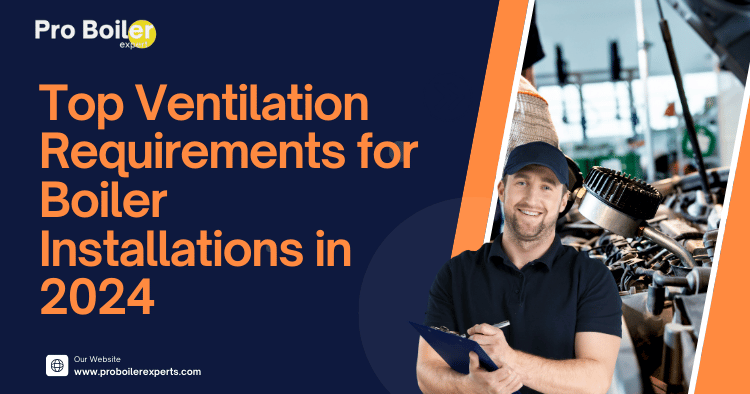Table of Contents
- Introduction
- Understanding Boiler Ventilation
- Key Ventilation Requirements
- Ventilation Systems Types
- Regulatory Standards and Codes
- Common FAQs
- Conclusion
Introduction
Boiler installations are essential for heating systems in both residential and commercial buildings. However, ensuring that these systems operate efficiently and safely requires proper ventilation. As we step into 2024, it’s crucial to stay informed about the latest ventilation requirements to ensure compliance and optimize performance. In this article, we’ll explore the key ventilation requirements for boiler installations, helping you navigate the standards that protect both users and the environment.
“Proper ventilation is not just about compliance; it’s about ensuring the safety and well-being of occupants.”
Understanding Boiler Ventilation
Ventilation in boiler systems is crucial for two primary reasons: providing sufficient air for combustion and safely removing combustion gases. Proper ventilation not only enhances the efficiency of the boiler but also ensures the safety of occupants by preventing the buildup of harmful gases like carbon monoxide.
“Think of ventilation as the lifeblood of your boiler system—it keeps everything running smoothly.”
Key Ventilation Requirements
Combustion Air Requirements
When a boiler operates, it requires a continuous supply of combustion air to burn fuel efficiently. Insufficient combustion air can lead to incomplete combustion, resulting in increased emissions and potential safety hazards.
To determine the appropriate combustion air requirements, you should consider:
- Boiler Size: Larger boilers require more combustion air. The general rule of thumb is to provide one cubic foot of air for every 1,000 BTUs of input rating.
- Fuel Type: Different fuels have varying combustion air requirements. For instance, natural gas burns cleaner and may need less air compared to oil.
“Always remember: the right amount of air is essential for a safe and efficient boiler operation.”
Ventilation Air Requirements
In addition to combustion air, boilers need ventilation air to maintain a safe operating environment. This air helps to dilute and remove any harmful gases that may accumulate. The specific ventilation air requirements depend on:
- Room Size: Ensure that the space where the boiler is installed has adequate volume. The National Fire Protection Association (NFPA) recommends a minimum of 50 cubic feet of space per 1,000 BTUs.
- Ventilation Pathways: These pathways should be unobstructed and lead directly to the outdoors. Grilles or ducts can be installed to facilitate the inflow of fresh air.
Exhaust Ventilation
Exhaust ventilation is vital for safely removing the byproducts of combustion, including carbon monoxide and other harmful gases. The installation must comply with local building codes, which often dictate:
- Chimney Specifications: Ensure that chimneys are properly sized and constructed to handle the exhaust gases. They should extend above the roofline to prevent any backdraft issues.
- Regular Maintenance: Routine inspection and cleaning of the exhaust system are essential to ensure proper airflow and prevent blockages.
Visual Representation
| Ventilation Type | Requirements | Notes |
|---|---|---|
| Combustion Air | 1 cubic foot of air per 1,000 BTUs | Depends on boiler size and fuel type |
| Ventilation Air | 50 cubic feet per 1,000 BTUs | Ensure unobstructed pathways |
| Exhaust Ventilation | Properly sized chimney | Regular inspection needed |
“Visual aids can help simplify complex requirements—make sure to refer back to this table!”
Ventilation Systems Types
There are several types of ventilation systems you can implement for boiler installations:
- Natural Ventilation: Utilizes passive airflow through openings without mechanical assistance. This is cost-effective but may not be sufficient in all situations.
- Mechanical Ventilation: Involves fans and duct systems to ensure a consistent flow of air. This system can be controlled and adjusted based on the specific needs of the boiler.
- Balanced Ventilation: Combines both supply and exhaust fans to maintain air balance in the system, optimizing efficiency and safety.
“Choosing the right type of ventilation system can significantly impact the performance and safety of your boiler.”
Regulatory Standards and Codes
In 2024, it’s vital to adhere to local and national codes regarding boiler ventilation. Key regulatory bodies include:
- The American Society of Mechanical Engineers (ASME)
- The National Fire Protection Association (NFPA)
- Local Building Codes: Always check your local regulations, as they may have specific requirements that differ from national standards.
For more in-depth information, you can visit the NFPA website.
“Staying updated with regulations not only ensures compliance but also enhances safety and efficiency.”
Common FAQs
1. What happens if my boiler is not properly ventilated?
Improper ventilation can lead to incomplete combustion, increased emissions, and the risk of carbon monoxide buildup, which is dangerous for occupants.
2. How often should I check my boiler’s ventilation system?
It’s recommended to inspect the ventilation system at least once a year, ideally during the boiler’s annual maintenance check.
3. Can I use my boiler without a chimney?
In some cases, you can use venting systems like direct venting or power venting, which do not require traditional chimneys. However, ensure compliance with local codes.
4. Are there any technological advancements in boiler ventilation systems?
Yes! Innovations like smart ventilation systems can automatically adjust airflow based on real-time combustion data, enhancing efficiency and safety.
“Advancements in technology are making boiler systems smarter and more efficient—stay informed!”
Conclusion
Ensuring proper ventilation for boiler installations is not just a matter of compliance; it’s essential for safety and efficiency. By understanding the key ventilation requirements and keeping abreast of regulatory changes, you can maintain a safe and effective heating system in your home or business. As we move through 2024, let’s prioritize safety and efficiency in our boiler installations. If you have any questions or need further assistance, don’t hesitate to reach out to a licensed professional. Your safety is worth it!
Also Look For:
For more information on the benefits of different types of boilers and how they can affect your heating system, explore our articles on Top 5 Benefits of Choosing Combi Boilers for Your Home, Top 5 Benefits of Choosing a System Boiler for Your Home, and Top 5 Benefits of Conventional Boilers for Your Home. Understanding the type of boiler that best suits your needs can also inform decisions about ventilation requirements and installation safety.




